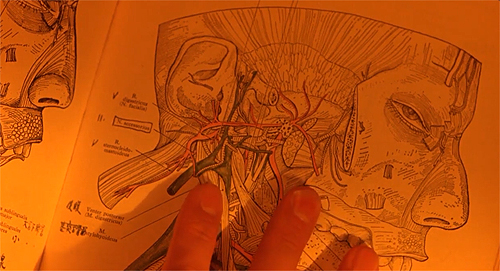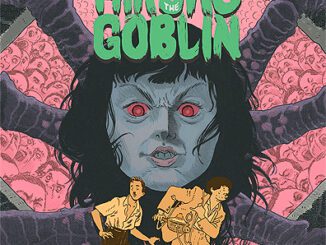Vital (2004)
Directed by: Shinya Tsukamoto
Written by: Shinya Tsukamoto
Starring: Jun Kunimura, Kiki, Nami Tsukamoto, Tadanobu Asano

Coming soon to Blu-ray from Third Window Films
Welcome to the autopsy slab, and welcome back Tsukamoto fans. In what seems like a stylistic companion piece to Gemini, this is another tale of medical practices and doomed romances. However, while that was a story of two-faced schemes and double standards, this is more about grief and obsession. It’s also yet another film about amnesia which might not seem compelling, but there are other aspects to consider. Is there life after loss? Is someone really dead if their loved ones refuse to let go, in a physical sense? The murky images and smoky incinerator chimneys in the opening suggest this isn’t going to be a sentimental exploration of such things. There’s a lot going on in a movie full of dreams and memories, even if it’s not as potent as the title suggests.

As the Chu Ishikawa music gives way to howling and droning sound effects it’s clear this will be a film about detached minds that see technical details instead of emotional ones. Which is particularly appropriate since Takagi (Tadanobu Asano) has been in a car accident and can only remember his understanding of anatomy and dissection. How much of this partial memory is real and what is denial is up for debate as things progress, but it’s a fascinating start. The steely blue visuals suggest his cold mode of thinking; a technical state of mind that is unconcerned by ideas about the desires of the human soul. After being allowed back to school, for reasons that aren’t entirely clear, he’s drawn to ideas of the body as a machine over lectures with a more philosophical angle.
Meanwhile fellow student Ikumi (Kiki) has been drawn to one of her teachers for a different reason, resulting in a further tragedy. She also seems to be living in a state of denial although as things progress it’s clear she feels responsible. Things really come to head a three years into their university studies when work on a real cadaver begins, and both start to show new sides to their personalities. Ikumi, filled with regret and suddenly unable to handle the work, is drawn to Takagi and tries to start a relationship. But Takagi has fresh problems of his own when he starts to believe that body they are cutting open is his former girlfriend Ryoko (Nami Tsukamoto) who was killed in the crash that took his memory. A typical romantic melodrama this is not as things get more peculiar.
The workings of the human body and the desires of the human soul combine as the already damaged pair develop some rather masochist urges. On paper Takagi seems more able to deal with things as he makes dozens of intricate drawings of tendons and arteries. But despite one teacher joking about the average human heart lasting longer than a television set he bought it’s obvious the issues at hand are not so mechanical. His lack of understanding blinds him to the fact that contacting Ryoko’s father (Jun Kunimura) is a bad idea, finally leading to some relatable anger and bewilderment. Takagi barely talks until flashbacks arrive, but when he does it’s not always sensible. Instead he starts to develop some odd obsessions with death that cause rifts between him and the people who are still alive.

As his memories blur into fantasy it’s interesting to see how the visual style plays into these emotions. His dreams are full of natural greenery and blue skies, while his real apartment is dripping and covered in mildew. Facing reality is obviously a difficult prospect for many of the characters, something that is made harder by the apparently rotting nature of their day to day lives. The only real beauty for long stretches comes from the artwork used to show the contents of Takagi’s notebook; pencil sketches of tissue replacing Tsukamoto’s usual industrial wires. Clearly this is where Takagi’s real enthusiasm lies as the delineation becomes stronger and the medical work becomes more hazy. However, with all this potent imagery of bubbling mental faculties and decaying matter the film’s pacing suffers.
It might be three years into the course and four months into the project but it sometimes feels like the dissection has been going on forever. In this later period there’s more death and even self-harm, relationships get harsher, dreams become more vivid, and Takagi starts to believe his fantasy is real. But there’s not a huge amount of energy to any of the proceedings and not all the themes are fully developed. Takagi and Ikumi aren’t exactly brimming with charisma because of their very natures, but it’s something that also makes the film feel sluggish or even stationary as the third act comes around. Only Ryoko’s father lends the situation some much needed emotional drive; the standout performance is Jun Kunimura who goes from murderous fervour to contemplation as things unfold.
Of course the story is told from one perspective. So while it’s interesting that Ryoko seems more alive in Takagi’s mind (though he never draws her face) there’s a lack of vigour which can be frustrating, despite the subject matter. Still, while it lacks the hydraulic powered editing of Tsukamoto’s earlier work the more thoughtful mood has its merits too. Once the finality of the situation sets in some characters (but perhaps not all) do at least start to make peace with it all. Is it better to grieve and move on or is it better to forget entirely? It depends on who you feel more sympathetic towards. It may not be the ideal resolution after all the endless rain storms and angry ruminations, but it does eventually try and stick to a closing message. If nothing else it’s an interesting selection of perspectives on life, loss, and guilt, which is worth checking out.
Rating: 









Further Reading:





Be the first to comment